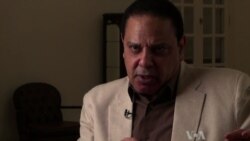CAIRO —
The unity that marked Egypt's 2011 uprising against Hosni Mubarak has fractured, leaving the country polarized, mostly between Islamists aligned with the Muslim Brotherhood and supporters of the military-backed government. Caught in the middle is a small and increasingly isolated group whose main interest is democracy. A leading voice in this liberal and largely secular movement is Alaa al-Aswany, one of the region's best-known writers.
It is not easy being a liberal in Egypt. Alaa al-Aswany, the nation's leading novelist and champion of the 2011 revolution, despairs at what he sees as a flight from democratic values.
“You don’t have a political conflict in the democratic sense, you have a kind of war between terrorist groups and the state,” said Aswany.
Aswany was one of the few intellectuals to defend the Muslim Brotherhood's right to run in post-revolution elections. Yet he was happy to see Islamist president Mohamed Morsi deposed, ending what Aswany saw as his absolutist vision. However, he now says democracy is still a distant prospect.
“The struggle is not done. It has just begun, you see, because getting rid of these people which were a real barrier against democracy, you still have the real struggle between the revolution and the old regime,” said Aswany.
Aswany's struggle against the authoritarian state has been a long one. He rose to fame with his 2002 novel and subsequent film The Yacoubian Building, one of the first to expose police brutality and state corruption. He was one of the few famous faces to appear on Tahrir Square each day of the 2011 revolution. A month later, his blunt, televised exchange with then prime-minister Ahmed Shafik electrified the nation. Shafik resigned the next day.
“I will never expect the old regime or the military to give us, you see, democracy as a present. We must work and we must make pressure until we get to achieve what the revolution wanted,” said Aswany.
Aswany's stand has sparked anger on both sides of the political divide. He has received various threats; a bullet was fired into his home. At a recent appearance in Paris, he was besieged by Morsi supporters.
"If you see how those people attacked me in Paris, how they looked, and how they looked at me. These people thought at that time that I am against the religion and that was very evident to me, very inspiring; I will write about it," said Aswany.
The author answers his critics the way he knows best - with words. His columns appear widely in Egypt and he has recently found an international audience as a commentator for The New York Times.
However, there is a catch: nearly one-third of Egyptians cannot read. Aswany believes one of the greatest barriers to liberal thought is illiteracy - something neither the military nor the Islamists have tried to erase.
It is not easy being a liberal in Egypt. Alaa al-Aswany, the nation's leading novelist and champion of the 2011 revolution, despairs at what he sees as a flight from democratic values.
“You don’t have a political conflict in the democratic sense, you have a kind of war between terrorist groups and the state,” said Aswany.
Aswany was one of the few intellectuals to defend the Muslim Brotherhood's right to run in post-revolution elections. Yet he was happy to see Islamist president Mohamed Morsi deposed, ending what Aswany saw as his absolutist vision. However, he now says democracy is still a distant prospect.
“The struggle is not done. It has just begun, you see, because getting rid of these people which were a real barrier against democracy, you still have the real struggle between the revolution and the old regime,” said Aswany.
Aswany's struggle against the authoritarian state has been a long one. He rose to fame with his 2002 novel and subsequent film The Yacoubian Building, one of the first to expose police brutality and state corruption. He was one of the few famous faces to appear on Tahrir Square each day of the 2011 revolution. A month later, his blunt, televised exchange with then prime-minister Ahmed Shafik electrified the nation. Shafik resigned the next day.
“I will never expect the old regime or the military to give us, you see, democracy as a present. We must work and we must make pressure until we get to achieve what the revolution wanted,” said Aswany.
Aswany's stand has sparked anger on both sides of the political divide. He has received various threats; a bullet was fired into his home. At a recent appearance in Paris, he was besieged by Morsi supporters.
"If you see how those people attacked me in Paris, how they looked, and how they looked at me. These people thought at that time that I am against the religion and that was very evident to me, very inspiring; I will write about it," said Aswany.
The author answers his critics the way he knows best - with words. His columns appear widely in Egypt and he has recently found an international audience as a commentator for The New York Times.
However, there is a catch: nearly one-third of Egyptians cannot read. Aswany believes one of the greatest barriers to liberal thought is illiteracy - something neither the military nor the Islamists have tried to erase.





